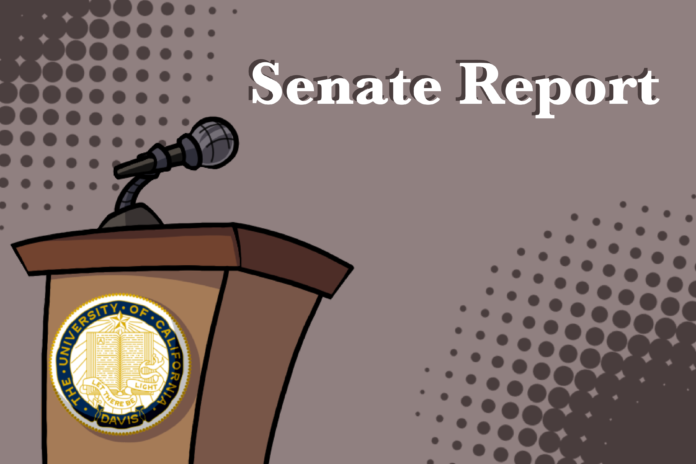Controversial closed session called over appointment
Editor’s Note: At the time this article was written, the May 14 ASUCD Senate Meeting had not taken place. At that meeting, Jenna DiCarlo was confirmed as a member of the ASUCD Judicial Council, and the ASUCD Senate was able to conduct regular business.
The May 7 ASUCD Senate meeting was called to order at 6:11 p.m. on May 7 by Vice President Akhila Kandaswamy.
The Senate had not met for the previous two weeks due to a vacancy on the Judicial Council (JC). Senate President Pro Tempore Samantha Boudaie began the meeting by introducing the recommended candidate, Jenna DiCarlo, a second-year international relations major, to fill the vacancy.
After her introduction, controller Kevin Rotenkolber, who arrived late, motioned to move the Senate into a closed session that included DiCarlo. The motion was seconded by Kandaswamy.
The closed session lasted more than an hour. DiCarlo was not appointed during the closed session, so the meeting was forced to end early. Under the ASUCD Bylaws, the Senate cannot meet if a vacancy exists on the JC for more than four weeks.
The closed session concerned DiCarlo’s appointment to the JC. According to Senator JB Martinez, the closed session focused on DiCarlo’s alleged partisanship, as she previously ran for Senate on the Thrive slate, and whether or not the Senate should be able to meet with all applicants directly to choose a candidate for the vacancy.
Interview committees usually meet with potential applicants before selecting the candidate that best fits the position requirements. This candidate is then introduced to the Senate where a public hearing takes place, and the Senate votes on whether or not to confirm the candidate.
“I personally believe the incident was politicized,” DiCarlo said. “I was discriminated against because of my personal political leanings that have nothing to do with my ability to be fair and impartial on [the] Judicial Council.”
Kandaswamy said the closed session was called in accordance with section 2105.(C)(2) of the Bylaws.
According to this section, however, “the ASUCD senate must motion for a closed session regarding personal matters, investment matters, or litigation matters. That motion must be seconded and approved by a majority of voting members of the ASUCD Senate. At this time, a closed session will be placed on the agenda of the next regularly scheduled meeting of the ASUCD Senate, unless otherwise specified in the motion.”
While the closed session was moved and seconded, there was no approval by the majority of voting members of the Senate. The session was also not planned in advance and, therefore, not scheduled in the agenda.
Kandaswamy said there were no objections raised to the closed session. According to Boudaie and DiCarlo, however, neither Rotenkolber nor Kandaswamy asked if there were any objections before moving into a closed session. They also said the reason for motioning for a closed session was unclear at the time. As a result, the senators did not vote on whether to move into a closed session, nor was there an opportunity to raise objections.
“The closed session was not a ‘planned closed session’ and was therefore not a part of the agenda,” Kandaswamy said via email. “That being said, the agenda did include ‘closed session’ as one of its items and was released over 48 hours in advance, so that was satisfied.”
The closed session that was on the agenda was meant to handle a different subject matter according to Kandaswamy, so it is unclear whether that section of the bylaws was satisfied as Kandaswamy claimed it was.
According to Boudaie, Kandaswamy’s claims that the closed session was released beforehand are also incorrect.
“The closed session was not announced 48 hours ahead of time, and without the general reasoning for holding the closed session also made public,” Boudaie said.
DiCarlo was also not informed that she had the right to a public hearing, according to Boudaie, Kandaswamy and DiCarlo.
Bylaw section 2105(C)(3) states that “the appointee or employee shall be given written notice of their right to have a public hearing. This notice shall be delivered either in-person or via email at least forty-eight hours before the closed session to the appointee.”
“I definitely was not notified 48 hours in advance,” DiCarlo said.
According to Bylaw section 2105(C)(4), “if notice is not given, any disciplinary or other action taken against any appointee or employee at the closed session shall be null and void.”
As of the time of writing, the issue has been sent to the Judicial Council for review, and as of the time this article went to press, the ruling was not available on ASUCD’s website.
Written by: Ally Russell — campus@theaggie.org
Correction: A previous version of this article stated that Jenna DiCarlo previously ran for Senate on the UNITE slate. That is incorrect. DiCarlo ran on the Thrive slate. The article has been updated to reflect this change. The Aggie regrets the error.









